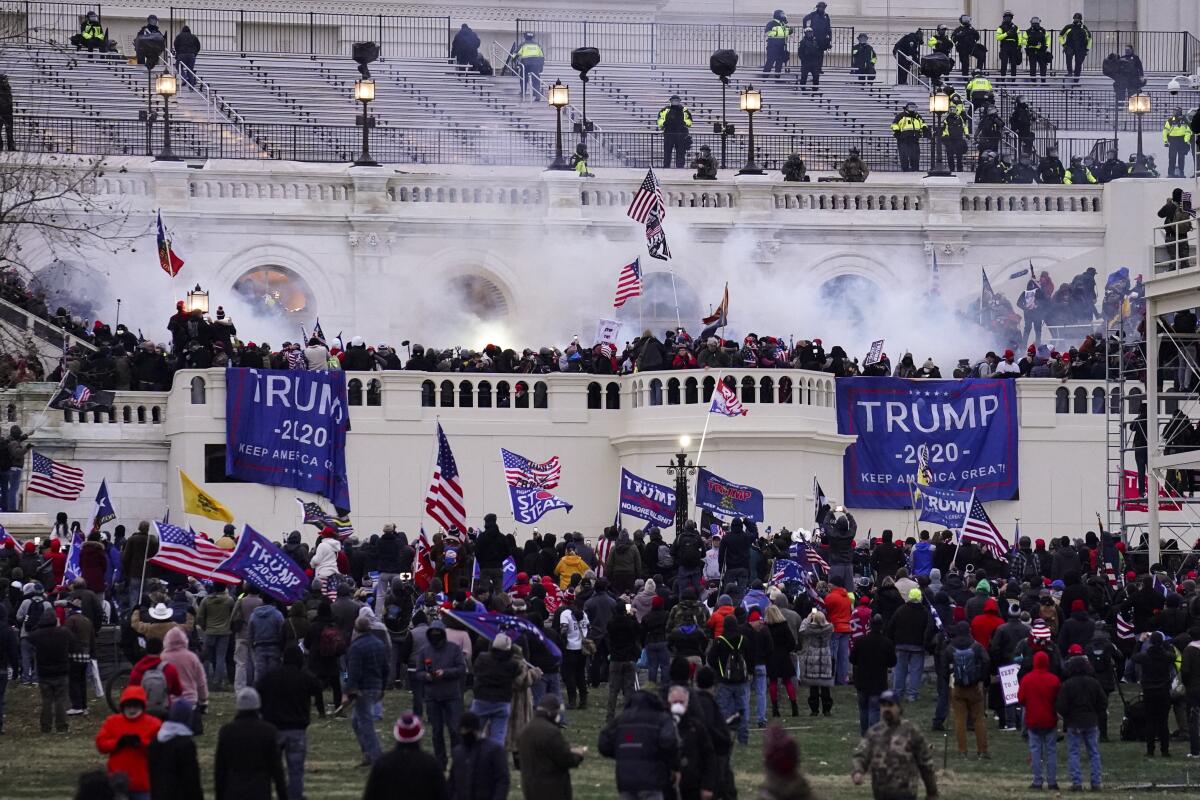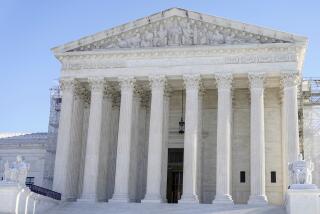Trump defenders say his encouragement of Capitol mob was protected by 1st Amendment

WASHINGTON — House impeachment managers said in a brief filed Tuesday that former President Trump “summoned a mob to Washington, exhorted them into a frenzy, and aimed them like a loaded cannon down Pennsylvania Avenue,” putting everyone on Capitol Hill in grave danger.
Trump’s lawyers, however, claimed that whatever statements he made to his supporters were protected by the 1st Amendment. In their initial response to the charges in his second impeachment, his lawyers also argued that the Constitution does not allow the Senate to try the case because he no longer holds office.
The impeachment case is a legal “nullity” since “the 45th president cannot be removed from an office he no longer occupies,” the lawyers wrote.
Trump’s supporters in the Senate have urged him to emphasize the claim that the Senate no longer can try him. That argument allows Republicans to side with him without saying they endorse his conduct.
Last week, all but five Republican senators backed a procedural vote aimed at dismissing the impeachment trial on those grounds — a strong indication that the Senate will not have the votes to convict Trump. At least 17 Republicans would need to vote for conviction, assuming all 50 members of the Democratic caucus vote against Trump.
The House impeached Trump last month, before he left office, on the grounds that he had incited an insurrection by urging his supporters to march to the Capitol on Jan. 6 as lawmakers were meeting to confirm President Biden’s electoral victory. The mob broke into the building in a melee that left five people dead, including a Capitol police officer.
In their 80-page brief, House prosecutors argued that Trump bears “unmistakable” responsibility for the riot because he whipped supporters into a frenzy by claiming for months that the election was being stolen and that there was no recourse but to fight.
“The gravity of President Trump’s offense is magnified by the fact that it arose from a course of conduct aimed at subverting and obstructing the election results,” the impeachment managers wrote. “President Trump is personally responsible for inciting an armed attack on our seat of government that imperiled the lives of the vice president, members of Congress and our families, and those who staff and serve the legislative branch.”
House managers’ initial brief in the 2021 Senate impeachment trial of Donald Trump
The House prosecutors, who filed their brief Tuesday a couple of hours before Trump’s lawyers responded in writing to the charges, had anticipated the defense arguments and aimed to rebut them in advance.
They pointed to impeachments in the early American Colonies, and in Britain, of people who had left office. Those examples, they said, would have informed the Founding Fathers’ understanding of how impeachment would be used, and make clear that an impeachment trial can take place after a president has left office.
Trump’s lawyers, former Pennsylvania prosecutor Bruce Castor and Atlanta-based defense attorney David Schoen, only signed up for the case in recent days after the former president parted ways with a team of attorneys headed by Butch Bowers, an attorney from South Carolina.
Several news organizations have reported that Trump wanted Bowers and his colleagues to repeat the false claim that the 2020 election had been stolen from him, and that they refused to do so.
In Castor and Schoen’s response to the impeachment, they stopped short of endorsing Trump’s claim while making clear he still holds to it.
“The 45th president exercised his 1st Amendment right under the Constitution to express his belief that the election results were suspect,” they wrote. “Insufficient evidence exists upon which a reasonable jurist could conclude that the 45th president’s statements were accurate or not, and he therefore denies they were false.”
The House managers argued in their brief Tuesday that the 1st Amendment does not protect Trump in the case of impeachment. Many statements that would be legally protected if an average citizen made them can amount to an abuse of power when coming from a president, they said.
“The 1st Amendment does not constrain Congress from removing an official whose expression makes him unfit to hold or ever again occupy federal office,” the prosecutors added.
Trump’s lawyers, in addition to denying his statements to the crowd before the assault on the Capitol were designed to incite violence, also denied Trump did anything wrong in a Jan. 2 telephone call in which he told Georgia Secretary of State Brad Raffensperger to “find” enough votes to overturn that state’s election results.
Trump “was expressing his opinion that if the evidence was carefully examined,” the necessary votes would be found, they said. They added that “it is denied that President Trump threatened Secretary Raffensperger” or that he “acted improperly in that telephone call in any way.”
The main emphasis of their submission, however, was the claim that the Senate can no longer try Trump because “the Senate has no jurisdiction” now that he is out of office.
That claim is a matter of considerable debate. The Constitution does not explicitly state that impeachment is reserved for current officeholders, though removal from office is the primary remedy. The Senate has once before held an impeachment trial of an official who had already resigned.
Democrats and many constitutional scholars say presidents should not be protected against impeachment simply because their crimes occur in the final days of their term. Accepting Trump’s argument would amount to giving presidents free rein to commit impeachable acts as long as they do so late enough in their tenure, House managers said.
Moreover, they pointed out, the House vote to impeach Trump took place while he was still in office and was therefore clearly constitutional.
The Constitution says the Senate “shall have the sole power to try all impeachments,” the prosecutors noted, adding that “this clause contains no reservation or limitation.”
“There is no ‘January exception’ to the Constitution that allows a president to organize a coup or incite an armed insurrection in his final weeks in office,” they said in a statement released with their brief.
They said Trump’s behavior was so egregious that it requires permanent disqualification from office, which is allowed as a punishment if he is convicted.
“This is not a case where elections alone are a sufficient safeguard against future abuse,” they say in the brief. “It is the electoral process itself that President Trump attacked and that must be protected from him and anyone else who would seek to mimic his behavior.”
More to Read
Get the L.A. Times Politics newsletter
Deeply reported insights into legislation, politics and policy from Sacramento, Washington and beyond. In your inbox three times per week.
You may occasionally receive promotional content from the Los Angeles Times.












